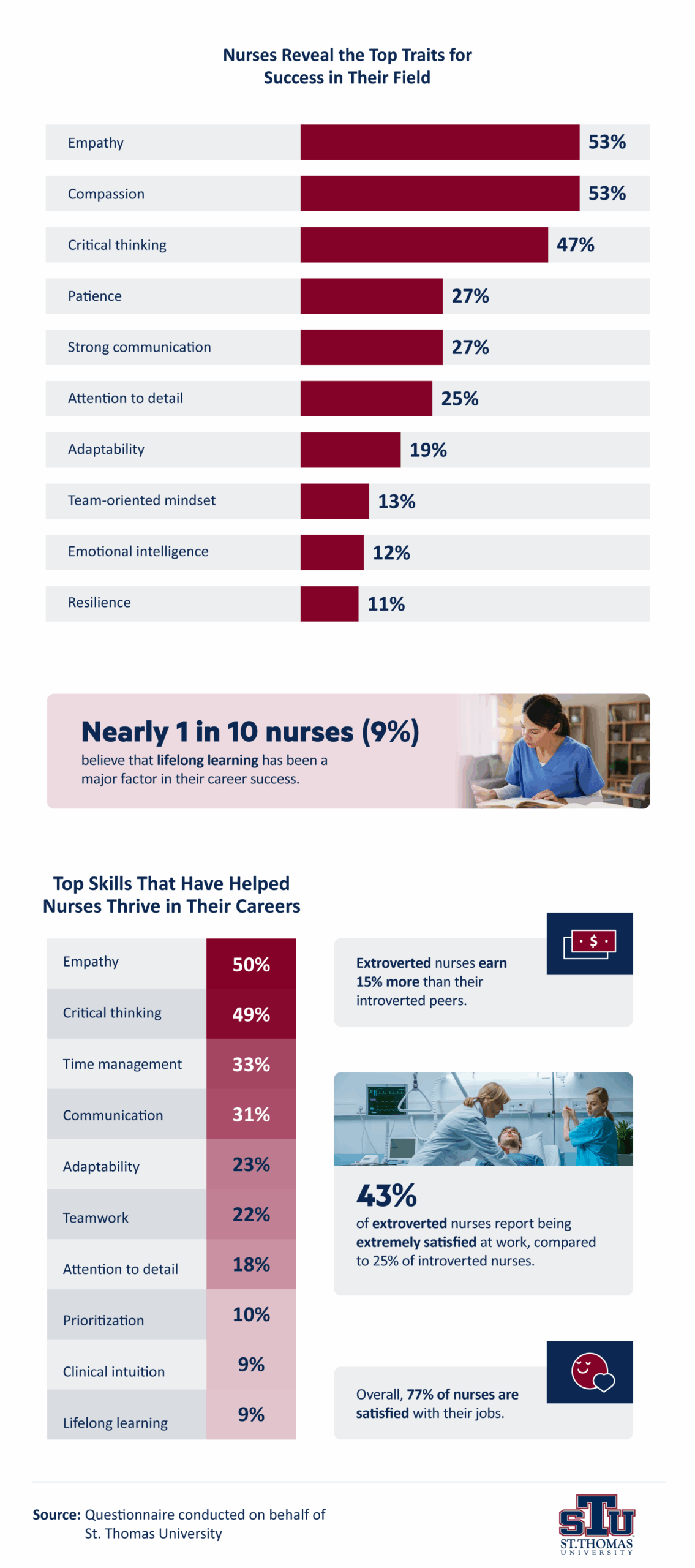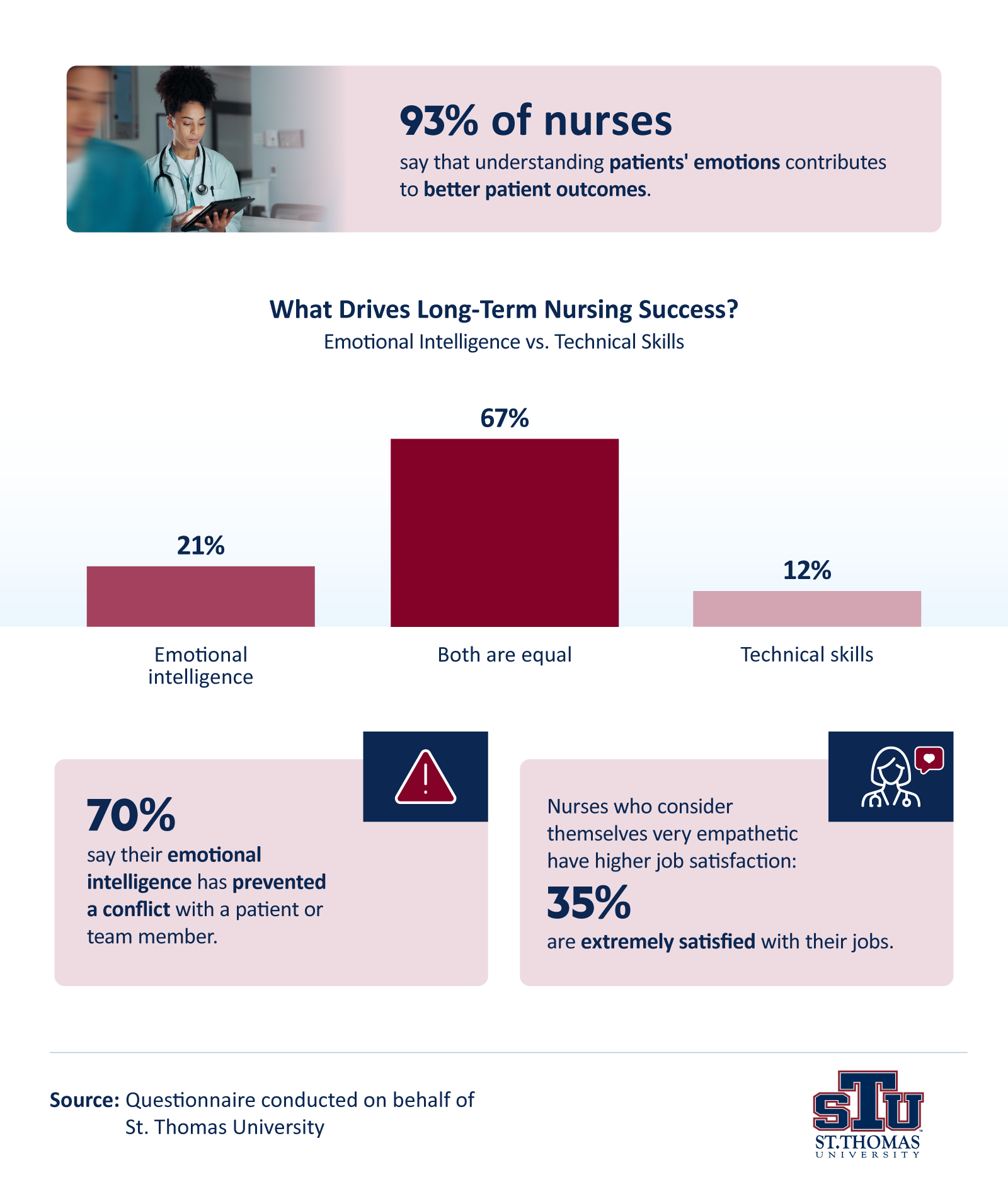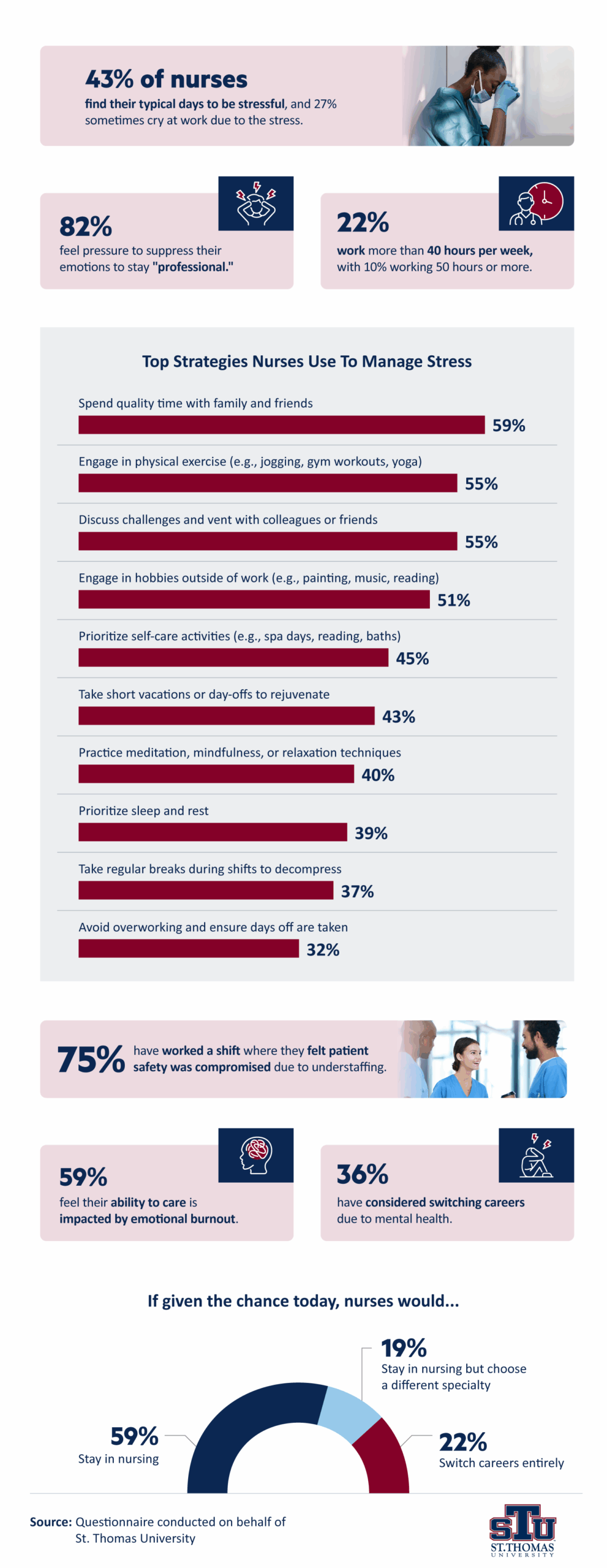
What defines success in nursing today? A recent survey of 180 U.S. nurses offers powerful insights. While technical expertise remains vital, emotional intelligence, especially empathy, is emerging as an equally critical factor. These findings could strongly influence higher education institutions designing or evolving nursing programs. As universities seek to equip students for workforce realities, this data can help academic leaders prepare future nurses for the emotional demands of the job.
Key Takeaways
- Two-thirds of nurses (67%) believe emotional intelligence and technical skills are equally important for long-term success. More than 1 in 5 (21%) say emotional intelligence matters more.
- 50% of nurses say empathy is what has helped them thrive the most in their careers.
- 99% of nurses believe emotional intelligence should be taught as a core skill in nursing school.
- 82% feel pressure to suppress emotions to appear “professional.”
- 36% have considered leaving the profession due to mental health challenges.
The Power of Empathy in Nursing
Emotional intelligence is a survival skill in today’s complex healthcare industry.

Half of the nurses surveyed said empathy has helped them thrive more than any other skill. Another 53% named empathy the most essential quality a nurse can possess, and 76% identified as highly empathetic. This soft skill can impact outcomes in hospitals and clinics, and thus, healthcare workers’ performance.
Personality type may impact this as well. Extroverts are naturally more expressive, so it stands to reason that those who are especially empathetic may express more empathy than others. In fact, nurses who consider themselves extroverts reported 15% higher average earnings and greater job satisfaction than their introverted peers. This could point to potential career benefits as a result of integrating emotional skills training into nursing education.
Why Emotional Intelligence Belongs in Every Nursing Curriculum
Emotional intelligence doesn’t just make a nurse more compassionate; it could also make them more effective.

Nearly all nurses surveyed (99%) stated that emotional intelligence should be a core part of nursing school training. This consensus highlights a need to prioritize emotional skills alongside technical instruction.
Most respondents (67%) said emotional intelligence and technical skills are equally important for long-term career success. Notably, 21% ranked emotional intelligence as even more essential.
The benefits are practical as well as philosophical: 70% of nurses reported that their emotional intelligence has helped them de-escalate or avoid conflicts with patients or colleagues. Programs that teach these skills could better prepare students for real-world healthcare challenges like these.
Nurses’ Mental Health Challenges And How They Cope
The emotional strain of nursing is profound, and nurses’ experiences could help educators prepare students for the realities of the field.

In this survey, 43% of nurses described their average day as stressful, and 27% admitted to having cried at work because of job pressure. An overwhelming 82% of nurses said they feel pressure to suppress their emotions to appear “professional.”
Compounding this, three-quarters of respondents reported having worked shifts where they felt understaffing had compromised patient safety. Understaffing can lead to burnout, an unfortunate effect that was slightly more prevalent among extroverted nurses (67%) than introverted ones (61%).
Mental health issues like this can take a toll on nurses’ careers: 36% have considered leaving the field altogether as a result. For universities, this is a call to prioritize emotional resilience and mental health education in nursing programs, especially considering how many nurses responded that, if given the chance today, they would switch careers entirely (22%).
Preparing Nurses for a Whole-person Profession
The path to nursing success isn’t paved solely with technical skills. Emotional intelligence — especially empathy — is another cornerstone of career resilience and patient care. As the healthcare field evolves, so must nursing education.
For universities committed to developing well-rounded, workplace-ready professionals, integrating emotional skills into curriculum design is essential. Build crucial skills and equip yourself to thrive in your career through one of St. Thomas University’s online nursing programs.
Methodology
This report is based on a survey of 180 nurses across the U.S, conducted from June 10-17, 2025. Respondents were asked to reflect on their skills, workplace challenges and views on emotional intelligence. While the findings offer valuable insight into nurse sentiment, the sample size limits broader generalizations. Results should be interpreted as directional for further study and academic program design.
About Risepoint
Risepoint partners with forward-thinking universities to build and grow online programs that truly align with workforce demands. From healthcare to tech and beyond, Risepoint helps institutions design relevant, career-focused curricula that equip students for long-term success in competitive fields.
Fair Use Statement
This article’s findings may be used for noncommercial purposes with proper attribution. If you reference this content, please include a link back to Risepoint as the source.